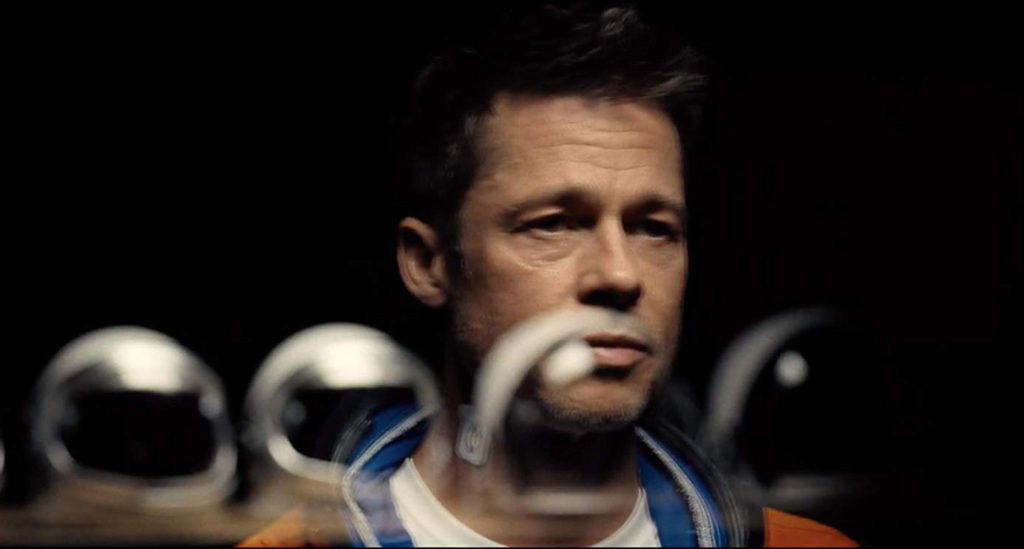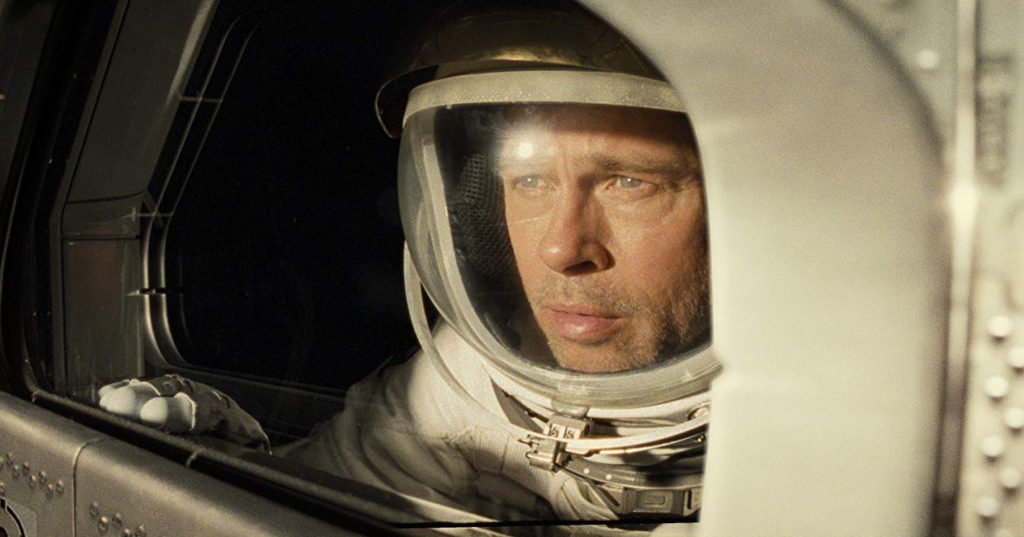Director James Gray’s “Ad Astra”—a latin term for, and literal meaning for “to the stars” is a thematic film, atmospheric and dark. It’s about Man’s quest for the stars, of our search for unexplored vistas and hitherto unexplored fantasies, while at the same time being ground in the soul, the psyche, and the wounded human spirt that yearns to have the unexplainable explained. It is ambitious while at the same time yearning not to be, emotional while paying homage and dedication to careful control and logic. It’s easily one of Brad Pitt’s best performances, filling the underrated actor’s resume alongside such stellar turns as “Se7en” and “Tree of Life.” And while critics are lauding Gray’s accomplishment here, something about the film – perhaps its choice of style over substance, perhaps its minimalistic score; perhaps its dreamlike, rote, and often obligatory dialogue left an experience in its wake I was able to see and experience, but not feel. This is a hard film to review; from the production value, to the sets, to the acting, to its themes, heart, and pulse, Gray excels. But yet something feels amiss, and yet I digress.
“Ad Astra” is set in the ‘near future,’ and is rife with twists and turns that set this time period apart from our own while narrating reasons while it isn’t that much different after all. In a way, “Ad Astra” is the truthful future in the same way as films like “GATTACA” and “Her;” films that offer grand technological advances that aren’t celebrated, alongside human emotion and states of being that are. Here, space travel is taken for granted, ‘commercial’ trips to the moon commonplace and offering all the comforts of home, including a pillow and a blanket pack for the bargain price of $125. We aren’t to understand if this sum is a lot of a little; “Ad Astra,” dreamlike in its execution, wishes to drag you headfirst into its cradle. You aren’t meant to suspend your disbelief to experience this film, but you aren’t exactly asked to hold onto it either. Further distinctions, such as wars over resources, espionage, and government secrets line its run-time, their poignancy highlighted not by how tragic they are, but how accepted and commonplace they appear. Like most movies about the future, “Ad Astra” shows that not much has changed, and offers a solemn prayer for humanity for this grave offense.
Our tour guide for this film is Roy McBride (Pitt), a astronaut of impeccable abilities, from his intellect, technical instincts, and superlative physical countenance. Critics hail the film’s opening sequence, depicting the building of an international space station that stretches from ground to space, and how McBride’s BPM never rises above 80, even during a dastardly fall from the top of the space station to Earth. But for all its nuances, one of “Ad Astra’s” better shots appears later, as McBride, a mere passenger on a shuttle to Mars—the last of future-man’s colonized planets—commandeers the shuttle and lands it perfectly when the pilot himself is unable to do so. It’s not the feat, but McBride’s lack of reaction to it, that cement his character. There’s seemingly little he cannot do; but, as we learn, there is one struggle he cannot overcome: the reconciliation and forgiveness of a father who abandoned him long ago. That McBride’s father (Tommy Lee Jones) is also a celebrated astronaut, but one who defected and may be responsible for an attack on Earth from a thought-lost craft marooned near Neptune, further complicates McBride’s psychology when he is tasked to reach out to him to right this wrong.

“Ad Astra” is a film like “Only God Forgives” and “You Were Never Really Here” that exists in visuals and symbolism, with little in the way of dialogue to carry the script. What dialogue does exist here exists to fulfill the film’s mission; to cause its dreamlike sequences to wash over the viewer like a collective consciousness. Critics will, and have, compared “Ad Astra” to Alfonso Cuarón’s “Gravity,” but I don’t believe that such comparison’s are fair to either film, or apt. “Ad Astra” is like “Gravity” in the same way that “Schindler’s List” is like “The Pianist;” themes are similar and backdrops may match. But the intention of the films, along with their execution, are vastly different. I will say this: both films have and will likely be misrepresented for being visual powerhouses – with this being their crowning achievement – when in truth they are profoundly about something more.
Everything else in Gray’s film is, on a technical level, top notch. There’s very little to complain about here, though some viewers, like myself, may find the artistic complexity of the film and the abstract yet purposeful dialogue hard to swallow. Ancillary characters played by such performers as Donald Sutherland and Ruth Negga add to the film in needed ways, but, amidst the powerhouse performance brought forth by Pitt, lose some of their effect. And the film’s keystone sequence between Pitt and Lee Jones, not to be hinted at here, seems to be too symbolic, too anticlimactic, and too explained to mesh with the artistry of the rest of the film. Rather than let audiences infer the experiences McBride has gleaned and to share his experience, we’re told, rather acutely, what he learned and how he’s changed. It seems like a small criticism in an otherwise majestic film, but one that I found profound.
At the end of the day, “Ad Astra” – already nominated at the Venice Film Festival for “Best Film”—is a worthy effort. It will find its audience much the same way films like “2001: A Space Odyssey” or the aforementioned “Tree of Life” found theirs. Gray has directed and co-written a film that attempts to transcend the space story and celebrate instead the human spirit. However, as I cautioned against comparing the film to “Gravity,” I find myself violating my own principle and ending on an unavoidable note. I’ve never lost a child, as Sandra Bullock’s Ryan Stone does in “Gravity,” nor lost a father in the sense that Roy McBride does in “Ad Astra.” But something in “Gravity” and Stone’s experience awoke something emotionally in me that I failed to feel at the conclusion of “Ad Astra.” “Ad Astra,” to me, celebrates the artistic and logical while “Gravity” celebrates the emotional. Insomuch as this may be true will ultimately be left up to the eye of the beholder.


